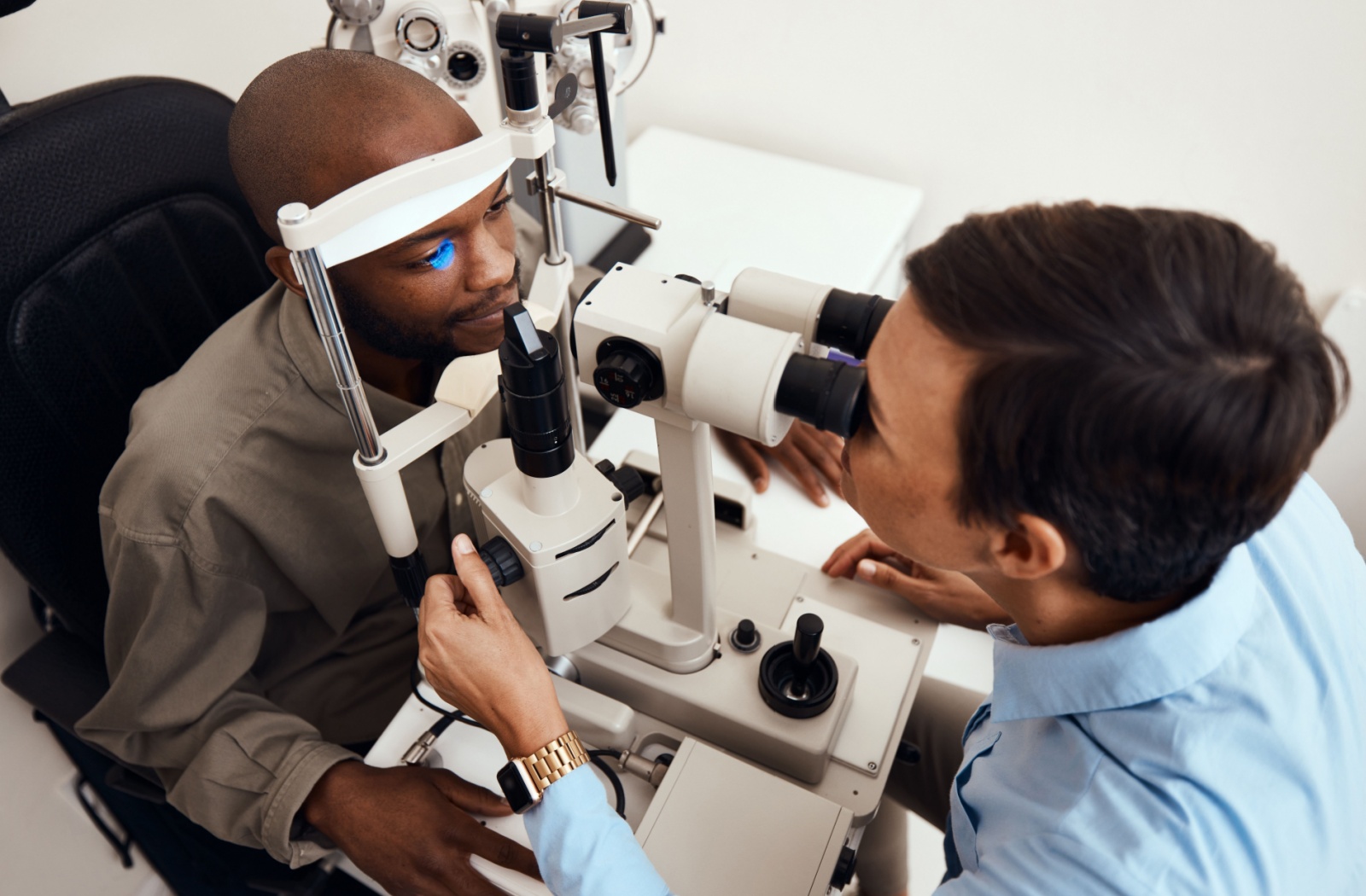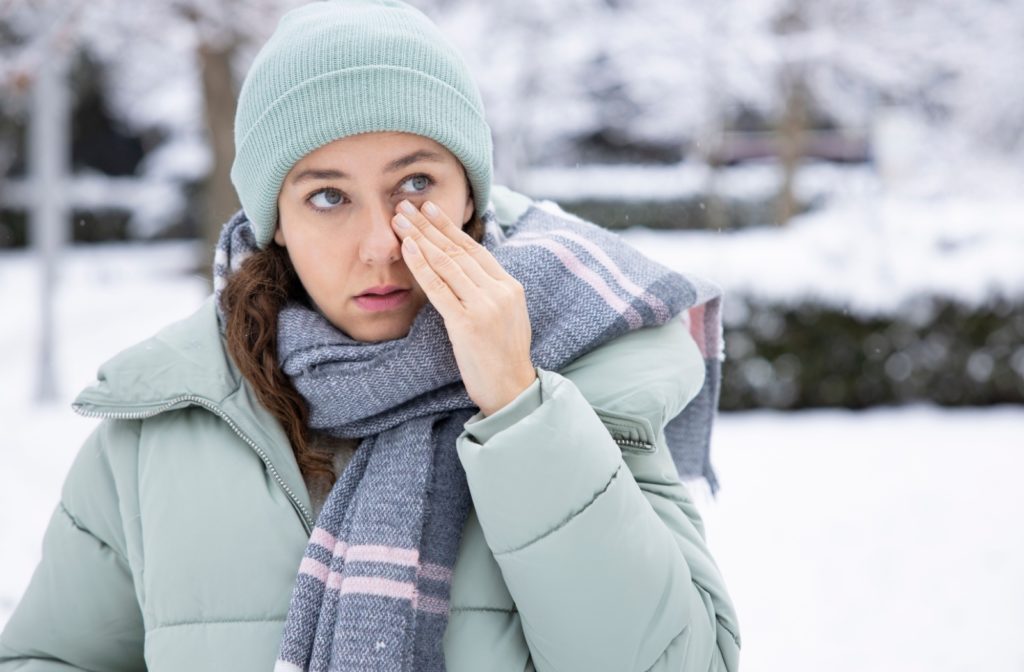Winter can be a magical season, especially for those who love winter sports. However, the cold air can wreak havoc on your eyes, leading to dry eyes and discomfort. Whether you’re a winter athlete or just enduring the cold, keeping your eyes hydrated in the winter is an important part of maintaining your eye health and preventing other eye issues.
Here are 10 steps we recommend to prevent dry eyes in winter:
- Wear Protective Eyewear
- Use Artificial Tears
- Stay Hydrated
- Limit Screen Time
- Invest in a Humidifier
- Apply Warm Compresses
- Avoid Smoking
- Maintain a Healthy Diet
- Blink Frequently
- Consult an Eye Care Professional
What Is Dry Eye
Dry eye is a very common condition. Dry eye symptoms affect millions of people around the world. It occurs when the eyes don’t produce quality tears or when the eyes don’t produce enough tears.
Symptoms
The signs of dry eyes can vary, but common symptoms include:
- Redness
- Irritation
- Gritty Sensation
- Blurred Vision
- Light Sensitivity
Causes of Dry Eye
Sometimes, dry eyes are caused by underlying conditions like meibomian gland dysfunction (MGD). But normal, everyday things can cause dryness.
Some common causes of dry eyes include:
- Dry Climates
- Wind
- Smoke
- Screen Time
- Fatigue
- Aging
Understanding these causes can help us prevent dry eyes.
Wear Protective Eyewear
Wind and cold air are major culprits of dry eyes during winter sports. Always wear protective goggles or glasses to shield your eyes from harsh elements. Look for eyewear with a snug fit to prevent wind from irritating your eyes. Wraparound glasses are especially useful for keeping the wind away from your eyes.
For additional protection, use eyewear that offers UV protection to prevent sun damage. Reflections from fresh snow in the wintertime can almost double UV radiation. Make sure your eyes are sufficiently protected from harmful sun rays.
Use Artificial Tears
Eye drops come in different types. If you’re searching for over-the-counter eye drops to alleviate dry eye symptoms, look for lubricating eye drops. Also called artificial tears, they can provide immediate relief for dry eyes. Keep a bottle in your bag and use it before, during, and after your outdoor activities.
Stay Hydrated
Dehydration can exacerbate dry eye symptoms. The surface of our eye is covered by a tear film, which helps protect our eyes from irritants and infections. When our body is dehydrated, our tear production may decrease and lead to dry eyes.
Staying adequately hydrated can help maintain this tear film, preventing dryness and irritation. Drink plenty of water throughout the day to keep your entire body, including your eyes, well-hydrated. Aim for at least eight glasses of water daily.
Limit Screen Time
Excessive screen time can strain your eyes and lead to dryness. Long hours in front of digital screens can reduce blinking frequency and lead to faster tear evaporation.
While it’s tempting to unwind with some screen time after a day on the slopes, try to limit your exposure and take frequent breaks to rest your eyes.
Invest in a Humidifier
Indoor heating can dry out the air, leading to dry eyes. Use a humidifier to add moisture to the air in your home. This can help maintain comfortable humidity levels, preventing your eyes from drying out.
Apply Warm Compresses
A warm compress can help stimulate your tear glands and improve moisture production. For people with clogged meibomian glands, warm compresses can help loosen the oil and reduce tear evaporation.
Simply soak a clean cloth in warm water, wring it out, and place it over your closed eyes for a few minutes.
Avoid Smoking and Smoke
Smoke can irritate your eyes and worsen dry eye symptoms. Avoid smoking and steer clear of smoky environments. If you’re around a campfire, make sure to protect your eyes from the smoke and stay a reasonable distance away.
Maintain a Healthy Diet
A diet rich in omega-3 fatty acids can help reduce inflammation and improve tear production. Include foods like salmon, flaxseeds, and walnuts in your diet to support eye health.
Additionally, caffeine and alcohol can lead to dehydration. While it’s okay to enjoy your morning coffee or the occasional drink, alcohol and caffeine intake should be moderated and always balanced with plenty of water.
Blink Frequently
When you’re focused on a task, whether it’s skiing down a slope or reading a map, you might blink less often. Make a conscious effort to blink frequently to keep your eyes lubricated.
Consult an Eye Care Professional

If you experience persistent dry eye symptoms, it’s essential to consult an eye care professional. While dry eyes are a common occurrence, persisting dryness and irritation can indicate underlying conditions.
Your eye doctor can help detect any underlying issues and provide personalized treatments to help manage your condition effectively.
Your Next Steps
Winter weather, whether you enjoy it or not, can take a toll on your eyes. By following these ten tips, you can enjoy the snowy season without the discomfort of dry eyes. Our team at Discover Eyecare is happy to give you personalized advice and treatment options.
Schedule an appointment with us today, and don’t let dry eyes spoil your winter!



